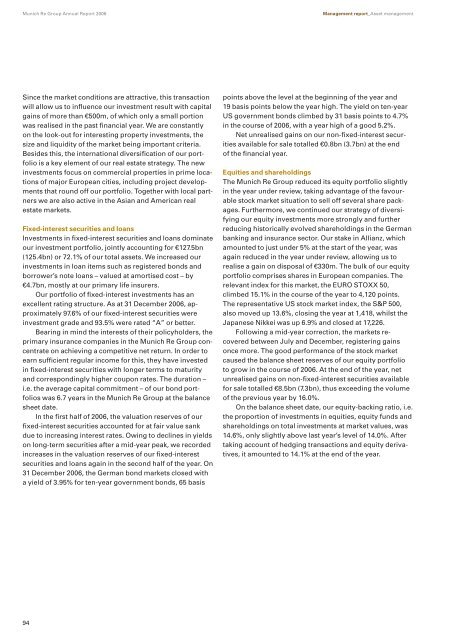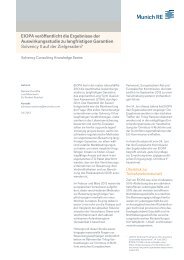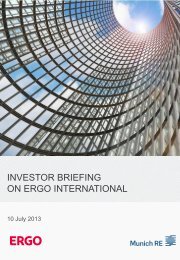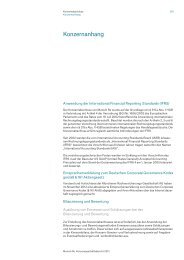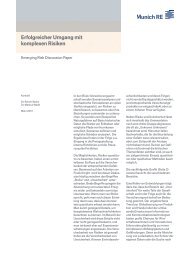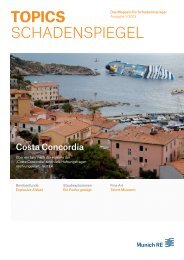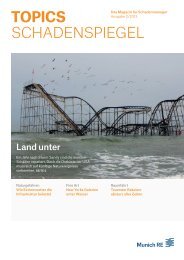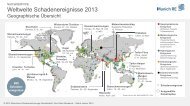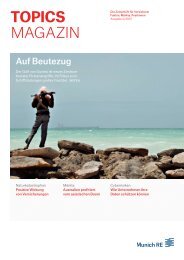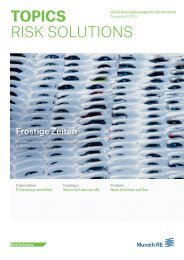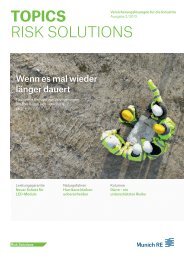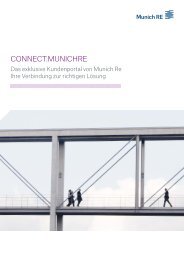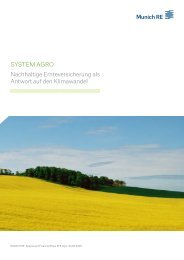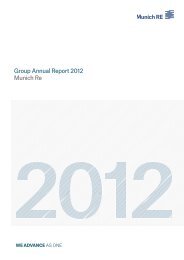Munich Re Group Annual Report 2006 (PDF, 1.8
Munich Re Group Annual Report 2006 (PDF, 1.8
Munich Re Group Annual Report 2006 (PDF, 1.8
You also want an ePaper? Increase the reach of your titles
YUMPU automatically turns print PDFs into web optimized ePapers that Google loves.
<strong>Munich</strong> <strong>Re</strong> <strong>Group</strong> <strong>Annual</strong> <strong>Re</strong>port <strong>2006</strong><br />
Since the market conditions are attractive, this transaction<br />
will allow us to influence our investment result with capital<br />
gains of more than €500m, of which only a small portion<br />
was realised in the past financial year. We are constantly<br />
on the look-out for interesting property investments, the<br />
size and liquidity of the market being important criteria.<br />
Besides this, the international diversification of our portfolio<br />
is a key element of our real estate strategy. The new<br />
investments focus on commercial properties in prime locations<br />
of major European cities, including project developments<br />
that round off our portfolio. Together with local partners<br />
we are also active in the Asian and American real<br />
estate markets.<br />
Fixed-interest securities and loans<br />
Investments in fixed-interest securities and loans dominate<br />
our investment portfolio, jointly accounting for €127.5bn<br />
(125.4bn) or 72.1% of our total assets. We increased our<br />
investments in loan items such as registered bonds and<br />
borrower’s note loans – valued at amortised cost – by<br />
€4.7bn, mostly at our primary life insurers.<br />
Our portfolio of fixed-interest investments has an<br />
excellent rating structure. As at 31 December <strong>2006</strong>, approximately<br />
97.6% of our fixed-interest securities were<br />
investment grade and 93.5% were rated “A” or better.<br />
Bearing in mind the interests of their policyholders, the<br />
primary insurance companies in the <strong>Munich</strong> <strong>Re</strong> <strong>Group</strong> concentrate<br />
on achieving a competitive net return. In order to<br />
earn sufficient regular income for this, they have invested<br />
in fixed-interest securities with longer terms to maturity<br />
and correspondingly higher coupon rates. The duration –<br />
i.e. the average capital commitment – of our bond portfolios<br />
was 6.7 years in the <strong>Munich</strong> <strong>Re</strong> <strong>Group</strong> at the balance<br />
sheet date.<br />
In the first half of <strong>2006</strong>, the valuation reserves of our<br />
fixed-interest securities accounted for at fair value sank<br />
due to increasing interest rates. Owing to declines in yields<br />
on long-term securities after a mid-year peak, we recorded<br />
increases in the valuation reserves of our fixed-interest<br />
securities and loans again in the second half of the year. On<br />
31 December <strong>2006</strong>, the German bond markets closed with<br />
a yield of 3.95% for ten-year government bonds, 65 basis<br />
94<br />
Management report_Asset management<br />
points above the level at the beginning of the year and<br />
19 basis points below the year high. The yield on ten-year<br />
US government bonds climbed by 31 basis points to 4.7%<br />
in the course of <strong>2006</strong>, with a year high of a good 5.2%.<br />
Net unrealised gains on our non-fixed-interest securities<br />
available for sale totalled €0.8bn (3.7bn) at the end<br />
of the financial year.<br />
Equities and shareholdings<br />
The <strong>Munich</strong> <strong>Re</strong> <strong>Group</strong> reduced its equity portfolio slightly<br />
in the year under review, taking advantage of the favourable<br />
stock market situation to sell off several share packages.<br />
Furthermore, we continued our strategy of diversifying<br />
our equity investments more strongly and further<br />
reducing historically evolved shareholdings in the German<br />
banking and insurance sector. Our stake in Allianz, which<br />
amounted to just under 5% at the start of the year, was<br />
again reduced in the year under review, allowing us to<br />
realise a gain on disposal of €330m. The bulk of our equity<br />
portfolio comprises shares in European companies. The<br />
relevant index for this market, the EURO STOXX 50,<br />
climbed 15.1% in the course of the year to 4,120 points.<br />
The representative US stock market index, the S&P 500,<br />
also moved up 13.6%, closing the year at 1,418, whilst the<br />
Japanese Nikkei was up 6.9% and closed at 17,226.<br />
Following a mid-year correction, the markets recovered<br />
between July and December, registering gains<br />
once more. The good performance of the stock market<br />
caused the balance sheet reserves of our equity portfolio<br />
to grow in the course of <strong>2006</strong>. At the end of the year, net<br />
unrealised gains on non-fixed-interest securities available<br />
for sale totalled €8.5bn (7.3bn), thus exceeding the volume<br />
of the previous year by 16.0%.<br />
On the balance sheet date, our equity-backing ratio, i.e.<br />
the proportion of investments in equities, equity funds and<br />
shareholdings on total investments at market values, was<br />
14.6%, only slightly above last year’s level of 14.0%. After<br />
taking account of hedging transactions and equity derivatives,<br />
it amounted to 14.1% at the end of the year.


